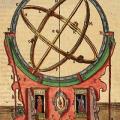393. The World Doesn’t Revolve Around You: Copernicus
How revolutionary was the Copernican Revolution?
Themes:
• J. Dobrzycki (ed.), E. Rosen (trans.), Nicholas Copernicus: On the Revolutions (London: 1978).
---
• H. Blumenberg, The Genesis of the Copernican World, trans R.M. Wallace (Cambridge MA: 1987).
• O. Gingerich and J. MacLachlan, Nicholas Copernicus: Making the Earth a Planet (New York: 2005).
• B. Goldstein, “Copernicus and the Origin of His Heliocentric System,” Journal for the History of Astronomy 33 (2002), 219-35.
• A. Goddu, Copernicus and the Aristotelian Tradition: Education, Reading, and Philosophy in Copernicus’s Path to Heliocentrism (Leiden: 2010).
• P.D. Omodeo, Copernicus in the Cultural Debates of the Renaissance: Reception, Legacy, Transformation (Leiden: 2014).
• N.M. Swerdlow and O. Neugebauer, Mathematical Astronomy in Copernicus’ De Revolutionibus (Berlin: 1984).
• R.S. Westman (ed.), The Copernican Achievement (Berkeley: 1975).
• R. Westman, The Copernican Question: Prognostication, Skepticism, and Celestial Order (Berkeley: 2011).
Thanks to Thony Christie and Karl Galle for their help with this episode!







Comments
Westman
While Westman's book is full of good material on astrology, it is mostly circumstantial in reference to Copernicus. That being said, in some part, I think, that the animosity shown toward the book is the desire not to tie astrology to any giant of science. This was very clear in reference to Galileo. While there is plenty of evidence for Galileo's involvement in astrology, such as horoscopes for his own children and friends, you almost never heard about it until recently. Great episode.
In reply to Westman by Dom Paschal R Scotti
Westman
Yes, actually I talked about this with my expert advisors Carl and Thony (thanked above). I thought it was worth mentioning even though the evidence is indeed circumstantial - in part because it helps flesh out the social context around the whole topic, whatever Copernicus himself thought (as we'll see in the next couple of episodes it is also relevant for Brahe and Kepler, but I'm guessing you know that).
Comment
This is one of the things I love about this series. History is all about context and you are really good at that. Almost everybody seems to believe in astrology and there are certainly people who are trying to reform it--though I don't think that Copernicus is one of them. I have learned so much in eras I know little about and in the eras I know better you are really good. That cannot be easy.
Heliocentric, or not quite Heliocentric?
Somewhere in my scattered (and frankly out-of-date) readings on matters Copernican came a notion that one of the reasons for Copernicus' apparent ambivalence about getting The Revolutions published even after ten years - in addition to wanting to get all the mathematics completely correct, and a fear expressed about the scorn with which he and his ideas might suffer - was the philosophically or theologically troubling aspect that the mathematics couldn't precisely place the sun at the centre of all the spheres (the fishbowl analogy is excellent, btw).
So I always wondered to what extent this was provably a part of Copernicus' concerns, and what the implications were for a 16th Century scientist coming to the conclusion that the exact centre of the universe was not the Earth, not even the Sun, but "void"? Albeit void with the Sun very close by.
Thanks to Kepler and Newton elliptical orbits in place of purely circular orbits were proven, which made the case for a pure Heliocentrism, but until then, surely the lingering doubt raised in The Revolutions about a possible "void-centre" must have played on the minds of those who understood it properly?
In reply to Heliocentric, or not quite Heliocentric? by Cardinal Pedant
At the center
Well, I guess it depends on how you look at it but I think that basically you are just getting at the need for eccentric circles or equants: the planetary orbits are not around a circle with the Sun at the center so you can either say the Sun is not quite at the center or that it is, but the circles don't quite go around that center. The latter is the way it is usually put in Ptolemaic astronomy.
Copernicus and hypothesis
What is most important, the rediscovery and application of the way of seeing developed by Plato (hypothesis or "second sailing"), and which will change the conditions of possibility of later scientific developments.
-cf. "Copernicus: Platonist Astronomer-Philosopher" (Matjaz Vesel, Peter Lang, 2014)
Hawking's view of Copernicus's findings
Thank you for another captivating episode. The discussion of whether Copernicus's findings were mathematical hypotheses or claims about reality reminded me of this comment from Stephen Hawking's Grand Design: "Although it is not uncommon for people to say that Copernicus proved Ptolemy wrong, that is not true. As in the case of our normal view versus that of the goldfish, one could use either picture as a model of the universe, for our observation of the heavens can be explained by assuming either the earth or the sun to be at rest. Despite its role in philosophical debates over the nature of our universe, the real advantage of the Copernican system is simply that the equations of motion are much simpler in the frame of reference in which the sun is at rest." I'm not that much of an agnostic about the relationship between mathematically-expressed laws of physics and reality, although I suppose one has to acknowledge the significant metaphysical ground to cover between the two. Anyway, I take this as further proof of the contemporary relevance of the history of philosophy -- a point to which I am wholeheartedly committed as a result of your many labors!!
Astronomical
What a great episode! I know nothing of astronomy or its history and really struggle to visualise the physical relations of things like this, but you dumbed it down just enough that I could get a mental hold of it but not enough that its important implications are lost.
Unrelatedly, it's a real bugbear of mine that we still peddle Voltaire's aphorism. I will gladly chew anyone's ear off about why it was Holy, Roman and an Empire if only they'll sit still for long enough!
On Copernicus and the Cultural Backdrop of His Ideas
Thank you for another good episode, but it would have been nice to mention the growing scholarship on Islamic astronomy and the works of al-Tusi, ibn-Shatir, and others who Copernicus is known to have drawn his ideas from. This would have been an important aspect of informing others about the cultural backdrop of Copernicus' ideas and the broader exchanges between various scholars.
It would have been also good to reference this recent research in the further readings as much of the readings you provide do not draw on this.
In reply to On Copernicus and the Cultural Backdrop of His Ideas by Lola Smyth
Tusi etc
You probably saw that I did cover Tusi in his own right in the Islamic series, right?
I'd be grateful for references to the contrary but as far as I know there is little or no solid evidence on actual historical links between these astronomers from the Islamic world and Copernicus. It's more that there are parallels between their independent breakthroughs, no? What would be the means by which their works would have been known to him, since they were not translated into Latin?
Retrograde Motions
Hi Peter,
In terms of Retrograde Motions of Venus and Mars, while it is true that the Earth " catches up " up to Mars, as its speed around
the Sun is greater, Venus, being closer to the Sun, travels faster than the Earth. You seem to have said that what was the case for
Mars is also the case for Venus, but you may be in error. It occurs around the 9 minute mark in your pod-cast.
In reply to Retrograde Motions by George Henry Watson
Mercury and Venus
Actually what I said is "astronomers had noted that the retrograde motions of Mercury and Venus, that is, the times where they seem to go backwards from our point of view, track the motions of the Sun. This is a lot easier to explain if you say that they are going around the Sun and not the Earth: it happens because the Earth is catching up with and then overtaking the inner planets relative to the Sun."
So this is right, isn't it? I mean, with Mercury (not Mars) and Venus we have the same mechanism because they are both closer to the Sun than the Earth is?
In reply to Mercury and Venus by Peter Adamson
Mercury, Venus and Mars.
Hi Peter,
I am not an astronomer, but the Mercury and Mars move faster than the Earth and Mars moves slower.
In terms of the appearance retrograde motion, I think the apparent Motion of Mars would appear much different than that of Venus and Mercury.
I don't think it is quite right to say that the Earth catches up and then is overtaking the inner planets relative to the Sun as they are moving faster than the Earth.
[ I may be 100 % wrong, but I thought I should let you know before what you said goes into Book Form. ]
I enjoy your podcasts very much and your books, keep up the good work.
Sincerely,
George Watson
In reply to Mercury, Venus and Mars. by George Henry Watson
Planets
This isn't my field either so I might well be wrong! But I did pass that script past an expert who didn't query these sentences, so I suspect it is right. I guess the key thing is that we are not talking about speed but apparent position relative to the sun (as measured from our position of sight). So you can imagine the Earth being to the left of Mercury, as it were, then continuing to orbit and being to the right of Mercury, so it would look from the Earth as if Mercury changed direction, if you supposed the Earth were standing still.
In reply to Planets by Peter Adamson
Mercury overtakes earth, but we do observe retrograde motion
see animation on top right: https://en.m.wikipedia.org/wiki/Apparent_retrograde_motion - PS: I love this podcast
In reply to Mercury overtakes earth, but we do observe retrograde motion by Martin
Mercury
Thanks, on both counts!
In reply to Mercury overtakes earth, but we do observe retrograde motion by Martin
Retrograde Motion
Thanks for the video.
Add new comment